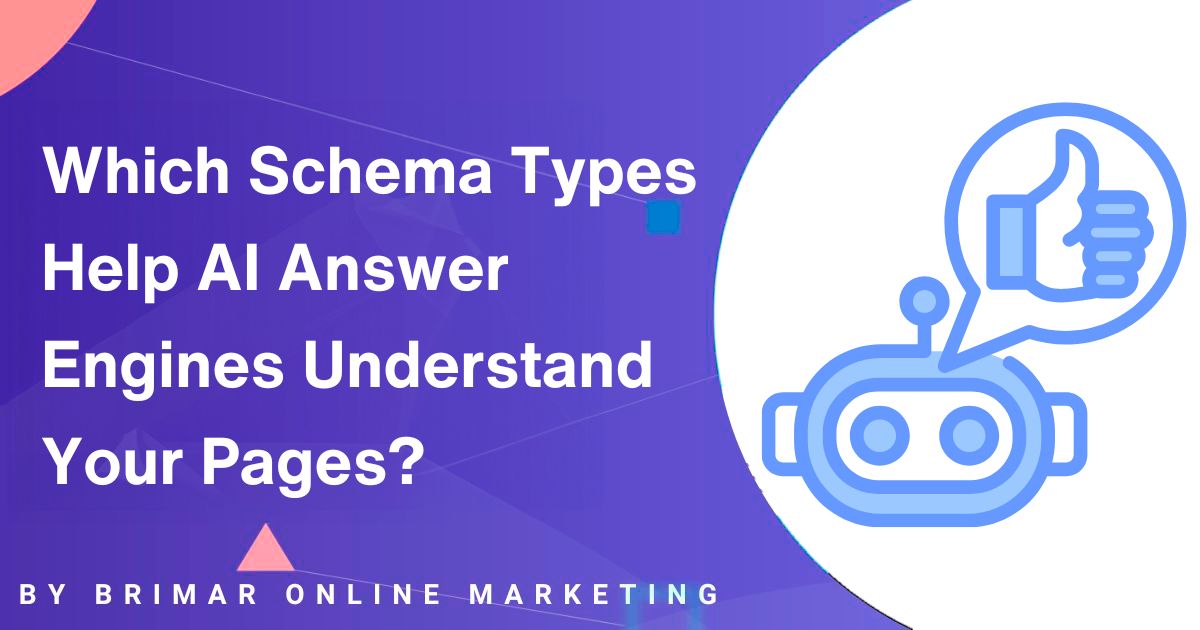
Something big is happening right now in search.
People are no longer just clicking through endless pages.
They want quick answers.
They want clear guidance.
And they want it fast.
That is why AI-powered search engines, answer engines, and AI assistants are taking a bigger role in how people find relevant information.
If you run a website, every change in search matters.
It affects your visibility, your traffic, your leads, and your sales.
It also affects whether your web pages show up inside AI-generated answers, AI-generated summaries, or the new boxes powered by large language models.
The truth is simple.
If you want these new AI systems and AI engines to understand your website content, you must give them clear signals.
Not long explanations. Not guesswork. Clear signals.
That is where schema types come in.
Schema is a type of code that tells artificial intelligence what your page is really about.
When your data markup is clean and correct, AI-powered tools have an easier time reading your content.
When it is messy or missing, they skip you and pick someone else.
Today, you will learn which schema types help the most, why they matter, and how to use them the right way.
Let’s start by understanding how AI models look at your pages before showing anything to the user.
How AI Models Read Your Web Pages
When you create great content, you want people to see it.
But before a person sees it, an AI engine sees it first.
These engines include Google Search, Google’s AI overviews, AI-powered search engines, voice assistants, and even tools like Microsoft Copilot.
All of them use natural language processing and advanced AI algorithms.
They scan your website and try to understand every line.
They look for keywords, topics, questions, answers, contact details, and product information.
They also look for clear patterns in your structured data.
If they find unstructured data, they struggle.
When they struggle, they stay quiet.
And if they stay quiet, that means your content never gets picked for AI-generated responses or direct answers.
This is where schema takes over.
Schema turns your messy information into a standardized format.
It works like a translation tool between your website and the ai engines that read it.
When you use the right schema types, your website becomes easier to understand.
It also improves your pages’ visibility in traditional search engines and the new generative search engines.
Both sides win.
Old-school search and AI-driven search.
This is important because the future of search results is already shifting.
People will see more answer content, more quick facts, and more AI-generated answers in Google SERPs.
Your schema markup is what helps your business stay visible inside this new world.
Start Attracting Customers Through SEO Today!
We can help you attract new customers through Tailored Search Engine Optimization Strategies for Your Business.
Why Schema Markup Matters More in the AI Era
Think of schema as a spotlight.
Without it, your website sits in the dark.
With it, AI tools notice your content faster and more accurately.
These days, millions of sites publish content.
But not all of them offer the clear structure that answer engines need.
If you want help standing out, schema types give you that edge.
Schema does a few important things:
- It tells ai engines exactly what your page covers
- It gives clear signals about the purpose of each section
- It highlights your product pages, your service area, and your contact details
- It helps you appear in rich snippets, star ratings, review stars, and knowledge graphs
- It improves your click-through rates because users see rich results
- It helps AI-powered tools trust your site enough to use it inside AI-generated summaries
This serves as the basic principle of answer engine optimization.
If you want AI-powered search engines to choose you, your data markup needs to be clean, simple, and accurate.
Now let’s look at the schema types that matter most.
The Schema Types That Help AI Understand Your Pages
You do not need every schema type.
You need the ones that match your web content.
Below are the most helpful schema types for AI-generated responses, search visibility, and strong rankings in both AI and traditional SEO.
1. Local Business Schema
If you work with local businesses, this is a must.
It teaches AI engines key details like:
- Your business name
- Your service area
- Your contact details
- Your phone number
- Your address
- Your opening hours
This schema gives AI-powered search engines all the relevant information they need to display your business in direct answers.
It also helps you appear in the knowledge panel and increases your local search results.
When someone asks a voice assistant for “a web designer near me” or “a marketing service in San Francisco,” this schema helps your page rise above the rest.
2. Product Schema
Product schema is one of the most important data types for selling online.
It organizes information such as pricing, features, availability, and review stars.
When AI-generated summaries pull from your product pages, they look for strong product schema.
This helps you appear in rich snippets and test previews for rich results.
It makes your brand look more trustworthy and improves your click-through rates.
AI engines love product schemas because they eliminate ambiguity.
3. FAQ Schema
FAQ schema is a powerful secret weapon for answering content.
It helps AI assistants and AI search engines find direct answers to common questions.
If you create FAQ pages or FAQ content, this schema tells AI systems exactly which questions and answers belong together.
This helps with:
- Quick responses inside Google’s AI overviews
- Short answers inside voice assistants
- AI-generated answers inside generative AI tools
FAQ schema also helps your readers.
It improves user experience because people can see your answers right away.
4. Article or Blog Posting Schema
If you publish blog posts, use the Article schema.
This type of code helps AI algorithms understand:
- The main topic
- The author
- The date
- The main claim
- The type of article
- the specific content inside
This schema makes your content easier for AI-powered tools to scan and categorize.
It also increases your chances of appearing in Google SERPs with rich snippets.
5. WebPage Schema
While many people skip it, WebPage schema helps search engines understand the purpose of each page.
For example:
- Is it a homepage?
- Is it a contact page?
- Is it a service page?
- Is it a product page?
When your page’s purpose is clear, AI-powered search engines can match your content with the right search intent.
This helps you secure better visibility inside AI-generated summaries.
6. Review Schema
The review schema highlights the experiences of real customers.
It adds:
- Review stars
- Star ratings
- Short feedback
- Trust signals
This improves user experience and search visibility.
It also increases the chance of appearing in rich snippets that show star ratings.
Review schema also supports AI-powered search engines because they often prefer content that shows real-world proof.
Google’s Preferred Format for Schema
Google prefers the JSON-LD format.
It is clean, simple, and easy for AI models to understand.
It also works well with most WordPress site plugins.
If you use tools like Yoast SEO or Rank Math, you can add this type of code without breaking your site.
You can even use an AI schema generator if you want a faster set-up.
After adding your schema, you can test it using rich results test tools or check it inside Google’s search gallery.
The goal is not to add as much schema as possible.
The goal is to keep your data markup tight and accurate.
Best Practices for Using Schema in the AI Era
Here are some best practices to help AI-powered search engines trust your website:
- Use schema types that match your web pages
- Avoid fake or misleading markup
- Do not add a schema for content that does not exist
- Keep your information updated
- Add a local business schema if you serve a local audience
- Add product schema for your product pages
- Use the FAQ schema for pages with clear questions
- Add Article schema for every blog post
- Keep your website content clear, simple, and helpful
- Aim for well-structured content and avoid unstructured data
- Make sure your exact keywords appear naturally in your content
The goal is to make your site easy to understand for both people and machines.
How AI Uses Schema Inside Search Results
When an AI-powered search engine looks at your page, it does a few things:
- It scans your schema
- It checks your content
- It confirms that your data is consistent
- It compares your answers to other sources
- It decides whether to use your page inside a generative experience
If your data markup is correct, you have a much better chance of appearing inside AI-generated responses or AI-generated summaries.
Proper schema markup also helps your site appear inside:
- Knowledge panel boxes
- Rich snippets
- Review stars
- Product highlights
- Map listings
- Direct answers
This improves your click-through rates and supports your overall content marketing and SEO strategy.
The Future of Schema and AI SEO
Search is changing fast.
AI-powered search engines are becoming the new standard for finding information.
That means answer engines will depend even more on structured data.
Generative experience results will only grow.
Google’s Gemini will play a bigger role.
More answer engines will utilize generative AI to provide users with quick solutions.
This means the importance of schema types will only continue to rise.
It is no longer something you add at the end.
It is something you need from the very beginning.
If you want AI engines to trust your site, your structure must be clean.
Your signals must be clear.
Your data must be simple.
That is how you stay ahead in both AI search engines and traditional search engines.
Final Thoughts
A schema is not complicated when you understand what AI models are looking for.
They want clarity.
They want structure.
They want real details.
They want well-organized information that makes sense.
If you give them that, they will reward you with better search visibility, better rankings, and more exposure inside AI-generated answers.
And if you need help setting up schema types, organizing your data markup, or improving your AI SEO, just let me know.
We can help you implement schema markup the right way so your business shows up where people are searching today.
Our SEO Services Have Helped Our Clients Increase Their Revenue!
“I highly recommend Brimar if your looking to grow your online business. You will be satisfied with the high level of expertise and high quality of services. It has helped my business grow by leaps and bounds.”
CEO

